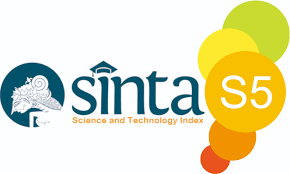Pengaruh Model Pembelajaran Model Problem Based Learning Dalam Meningkatkan Kemampuan Berpikir Spasial Di SMAN 13 Samarinda
DOI:
https://doi.org/10.30872/geoedusains.v5i1.3446Keywords:
Problem based learning; spatial thinking skills; geographyAbstract
Problem based learning is learning model that is considered capable of improving spatial thinking skills is the problem-based learning. This model is a learning model that is based on constructivism and accommodates student involvement in learning and engaging in contextual problem solving. This research was conducted with the aim of knowing the effect of the problem-based learning model on the spatial thinking skills of SMA Negeri 13 Samarinda class students in geography subject. The sample in this study consisted of 2 classes, namely class X IPS 1 as the experimental class using the problem based learning and class X IPS 2 as the control class using the discovery learning model. The data collection method was carried out using a test in the form of a pre-test and post-test. Based on the results of the analysis using the anova test, it can be seen that the sig values (p-values) for the experimental and control classes were 0.000 and 0.001 respectively, which were smaller than the significance level of 0.05. It was concluded that problem based learning affects the ability to think spatially.
Downloads
References
Aliman, M., Budijanto, Sumarmi, Astina, I. K., Putri, R. E., & Arif, M. (2019). The effect of earthcomm learning model and spatial thinking ability on geography learning outcomes. Journal of Baltic Science Education, 18(3), 323–334. https://doi.org/10.33225/jbse/19.18.323
Anwar, S. (2015). Pengembangan Kurikulum Geografi Berbasis Karakter Cinta Tanah Air. In In Prosiding Semnas dan PIT IGI XVII (pp. 254–259). BIG, IGI,UNJ, UGM.
Arvyaty, & Saputra, C. (2017). Pengaruh Model Pembelajaran Berbasis Masalah (PBM) Terhadap Kemampuan Penalaran Proporsional Peserta didik Sekolah Menengah Pertama. Jurnal Pendidikan Matematika, 4(1), 62–73.
Dewi, Y. K. S., Handoyo, B., & Purwanto, P. (2021). Model problem based learning dengan geospatial information: Implementasi dalam pembelajaran Geografi dengan untuk kemampuan spatial thinking. Jurnal Integrasi Dan Harmoni Inovatif Ilmu-Ilmu Sosial, 1(3), 388–398. https://doi.org/10.17977/um063v1i3p388-398
Halek, D. H. (2018). Kurikulum 2013 dalam Perspektif Filosafi. Jurnal Georafflesia : Artikel Ilmiah Pendidikan Geografi, 3(2), 1. https://doi.org/10.32663/georaf.v3i2.567
Khotimah, S. K., Prasetyo, K., Prasetya, S. P., & Nasution, N. (2022). Pengaruh Model Problem Based Learning terhadap Kemampuan Literasi Geografi pada Pembelajaran IPS Materi Kegiatan Perdagangan Antarwilayah dan Antarnegara. Jurnal Pendidikan : Riset Dan Konseptual, 6(3), 510. https://doi.org/10.28926/riset_konseptual.v6i3.547
Musanna, A. (2017). Indigenisasi pendidikan : //unsla-dev.uns.ac.id/neounsla/index.php?p=show_detail&id=220070&keywords=
Nofirman. (2018). Studi Kemampuan Spasial Geografi Peserta didik Kelas XII SMA Negeri 6 Kota Bengkulu. Jurnal Georafflesia, 3(2), 11–24. https://journals.unihaz.ac.id/index.php/georafflesia
Nurcahyo, A. D., & Winanti, E. T. (2021). Pengaruh model Problem Based Learning terintegrasi pendekatan induktif terhadap kemampuan berpikir spasial dan pengetahuan peserta didik pada materi mitigasi bencana. Jurnal Pendidikan Geografi, 26(1), 41–47. https://doi.org/10.17977/um017v26i12021p041
Ruhimat, M. (2015). Menambahkan Sikap Keberanian Kepada Peserta Didik Melalui Pendidikan Geografi. In In Prosiding Semnas dan PIT IGI XVII (pp. 226–231). BIG, IGI,UNJ, UGM.
Sari, U. (2018). Pengaruh Metode Pembelajaran Resitasi Berbasis Information Communication Technology ( ICT ) Terhadap Hasil Belajar Geografi Peserta didik Kelas X IPS DI SMA NEGERI 1 PALEMBANG Bimbingan Belajar Primagama Program Studi Pendidikan Geografi , Universitas PGRI Palemb. 3(2), 103–109.
Setiawan, I. (2016). Peran Sistem Informasi Geografis (Sig) Dalam Meningkatkan Kemampuan Berpikir Spasial (Spatial Thinking). Jurnal Geografi Gea, 15(1), 83–89. https://doi.org/10.17509/gea.v15i1.4187
Sugiyono. (2016). Metode Penelitian Pendidikan : Pendekatan Kuantitatif, Kualitatif, dan R&D. PT. Alfabet.
Surdin, S., & Alit, A. (2019). Faktor-Faktor Penyebab Rendahnya Hasil Belajar Peserta didik Pada Mata Pelajaran Geografi Kelas X Sma Negeri 1 Siompu. Jurnal Penelitian Pendidikan Geografi, 4(2), 77–91. https://doi.org/10.36709/jppg.v4i2.6992
Tasya Nabillah, & Abadi, A. P. (2019). Faktor Penyebab Rendahnya Hasil Belajar Peserta didik. Sesiomedika, 659–663.
Wijayanto, B., Sutriani, W., & Luthfi, F. (2020). Kemampuan Berfikir Spasial dalam Pembelajaran Abad 21. Jurnal Samudra Geografi, 3(2), 42–50. https://doi.org/10.33059/jsg.v3i2.2495
Yani, A., Mulyadi, A., & Ruhimat, M. (2018). Contextualization of spatial intelligence: Correlation between spatial intelligence, spatial ability, and geography skills. Journal of Baltic Science Education, 17(4), 564–575. https://doi.org/10.33225/jbse/18.17.564
Yuliana Rizkiwati, B., Jailani, H., Studi Pendidikan Ekonomi, P., & Hamzanwadi Selong baiq, S. (2015). Efektivitas Model Pembelajaran Problem Based Learning Dipadu Think Pair Share Terhadap Kemampuan Berpikir Kritis Dan Hasil Belajar Mahapeserta didik. Educatio, 10(2), 249–261. http://www.e-journal.hamzanwadi.ac.id/index.php/edc/article/view/170










